Both German shepherds and Labrador retrievers are affectionate dogs. They are outgoing, lovely, and people-oriented. But do labs and German shepherds get along? YES, they do. If you have both of them as pets, do ensure separate feeding, breed-appropriate diet, and separate sleeping areas. Your lifestyle must sync and have the time to accommodate these breeds together. Having them together can be a unique experience.
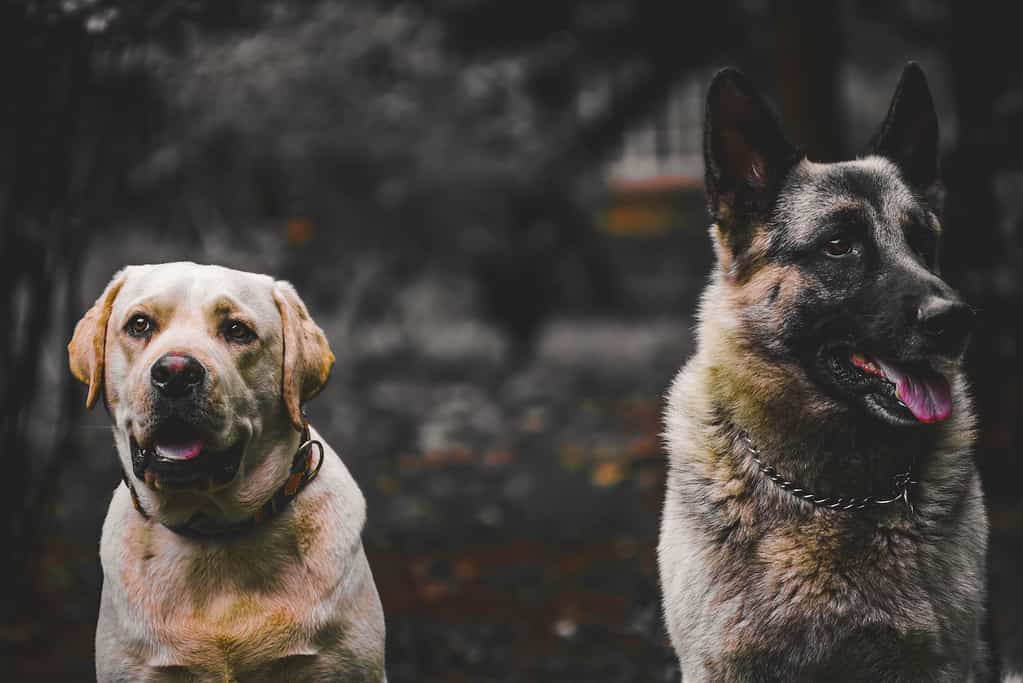
Temperament And Personality Of Labradors And German Shepherds
Labradors are friendly and playful with a high energy level. A German Shepherd has a strong work ethic and is intelligent, loyal, and protective.
Labradors
Labs are obedient dogs that love to please their owners. They enjoy being part of the family and do well in households with children or other dogs.
Labradors require regular exercise to stay healthy. Their strong desire to retrieve things makes them excel at activities like hunting. They are outdoor enthusiasts who need an activity partner and make good service dogs. They are always eager to learn new commands. With proper training and socialization, Labradors get along with most dogs.
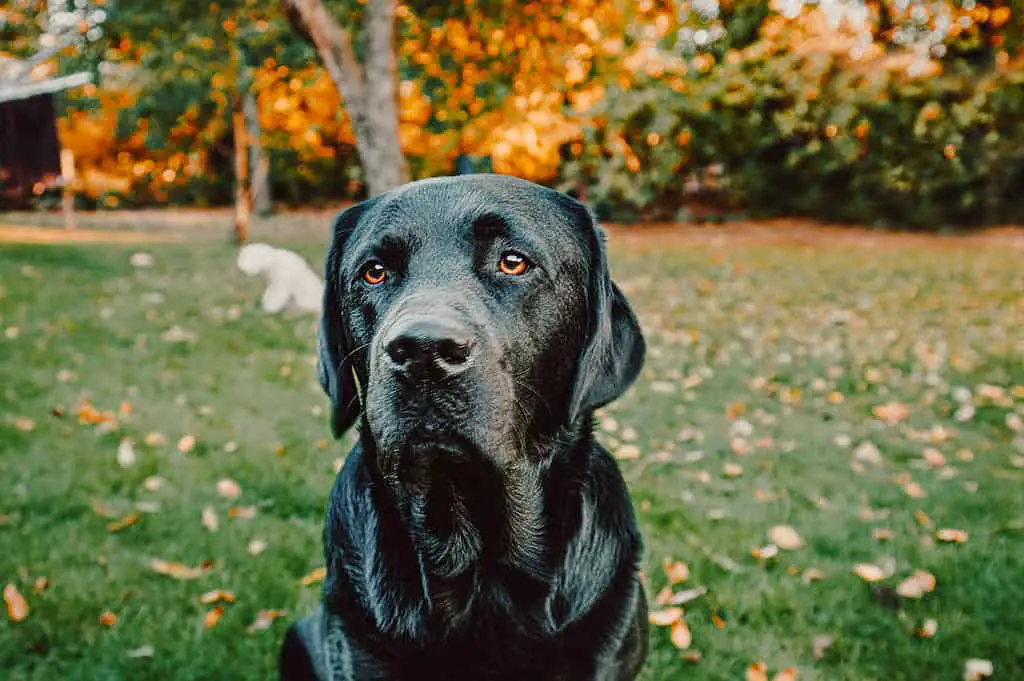
German Shepherds
A German Shepherd dog is brave and intelligent. They are natural protectors, making them a great choice for families looking for a protective companion. With proper socialization, they behave well around other dogs and pets.
These dogs were originally bred as herding dogs. German Shepherds are very energetic and need a lot of exercise to maintain a healthy weight. They may develop hip dysplasia later in life.
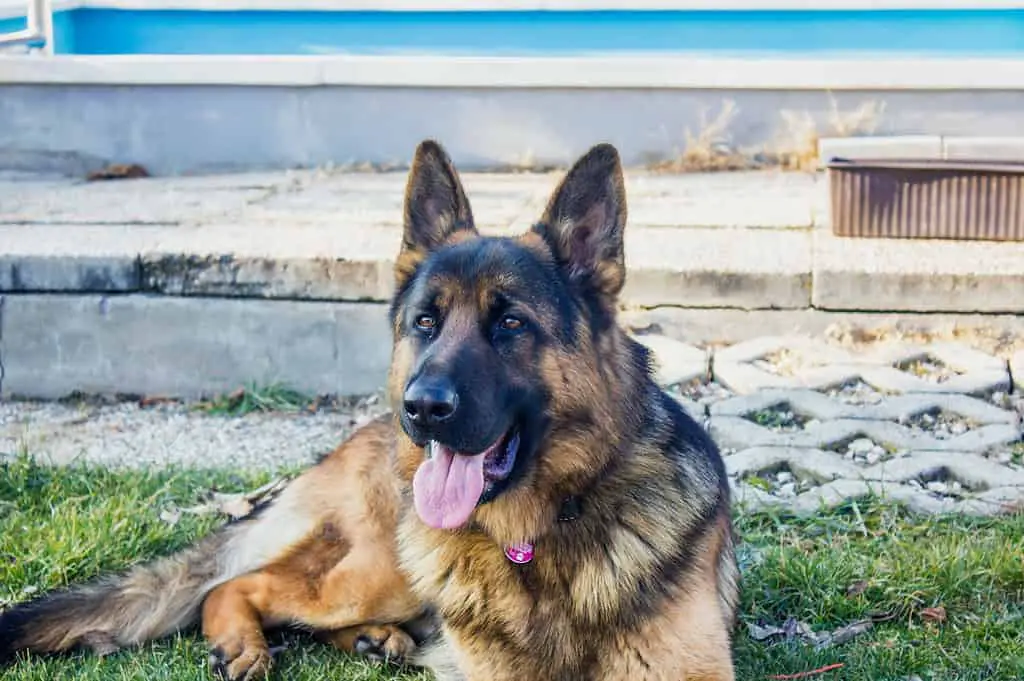
Compatibility Of Labradors And German Shepherds
Labradors and German Shepherds have a great potential to be compatible. A few reasons are their size similarities, activity levels, and similar personality traits.
Size Similarities
Labradors and German Shepherds are large dog breeds. German Shepherd dogs are slightly taller and heavier. Labs generally weigh 55 to 80 pounds, while German Shepherds range from 50 to 90. Both breeds have a similar body structure, with strong legs and athletic build. Their size makes them great for families who want a big dog that is still playful and fun-loving.
Activity Levels
Labradors and German Shepherds are energetic breeds. Owners must have ample home space or access to outdoor areas where dogs can run freely.
Both breeds enjoy running, swimming, hiking, and playing fetch. Pent-up energy can lead to destructive behaviors. Hence, adequate exercise must be provided. Do not over-exercise your dog, as this can cause joint problems. Regular walks and toys keep your dogs happy and active.
Personality Traits
Labs and German Shepherds thrive on attention. Exercise keeps them physically fit, mentally stimulated, and emotionally balanced. Labradors are more outgoing, friendly, and affectionate towards people than German Shepherds.
Labrador breed is gentle, making them great family and therapy dogs. However, German Shepherds can be more reserved or aloof with strangers. But the German Shepherd breed is very protective of its owners when threatened. They are known for their courage, agility, and versatility. German shepherd dogs become good service dogs.

Trainability, Exercise, Health, And Nutritional Requirements
Trainability
Both Labradors and German Shepherds are known for their trainability. Labs respond well to positive reinforcement methods like treats, praise, and playtime. They love learning new things and taking on any task given to them. It makes them great candidates for dog sports like obedience competitions or agility trials.
A German Shepherd dog also responds well to training. However, they have a more serious tone than the cheerful Labrador Retriever. German Shepherds require gentle handling by an experienced owner who understands their protective instincts. With early socialization, these dogs can be trained in obedience, search-and-rescue, police protection, or as service animals.
Prospective dog owners must understand that both breeds need consistent training. It stimulates their minds and avoids behavioral issues such as excessive barking or destructive chewing. Dogs thrive when mentally challenged while obeying commands. It encourages bonding with their human family members.
Exercise Requirements
Both Labradors and German Shepherds are high-energy dogs. Labs need at least one hour of physical activity daily, while German Shepherds need even more.
At least two hours of intense exercise a day is recommended for a German Shepherd. Regular exercise prevents boredom and restlessness. Without enough stimulation, both breeds can become destructive. They must be able to find ways to burn off their energy.
Nutritional Requirements
Both Labradors and German Shepherds have hearty appetites. Feed them a balanced diet based on age, weight, and activity level. For both breeds, high-quality dog food with real meat as the primary ingredient is recommended.
Labradors tend to overeat, leading to weight gain and health problems. German Shepherds are prone to sensitive stomachs. Choose a diet that won’t upset their digestive system. Overfeeding or giving them human food is harmful or toxic. Consult with your veterinarian about the best dietary plan.
Health Concerns
Labradors and German Shepherds are prone to health issues due to their genetics. Labs are more susceptible to hip dysplasia, obesity, and eye problems. German Shepherds are predisposed to hip and elbow dysplasia, gastrointestinal disorders, bloat, allergies, and skin problems.
Proper diet and exercise can avoid or manage these conditions. Besides regular vet visits and a healthy lifestyle, invest in reputable breeders. A reliable breeder minimizes health concerns down the line. Inquire about genetic testing of parent dogs before breeding. It will reduce the risk of inheritable diseases passed on from generation to generation.
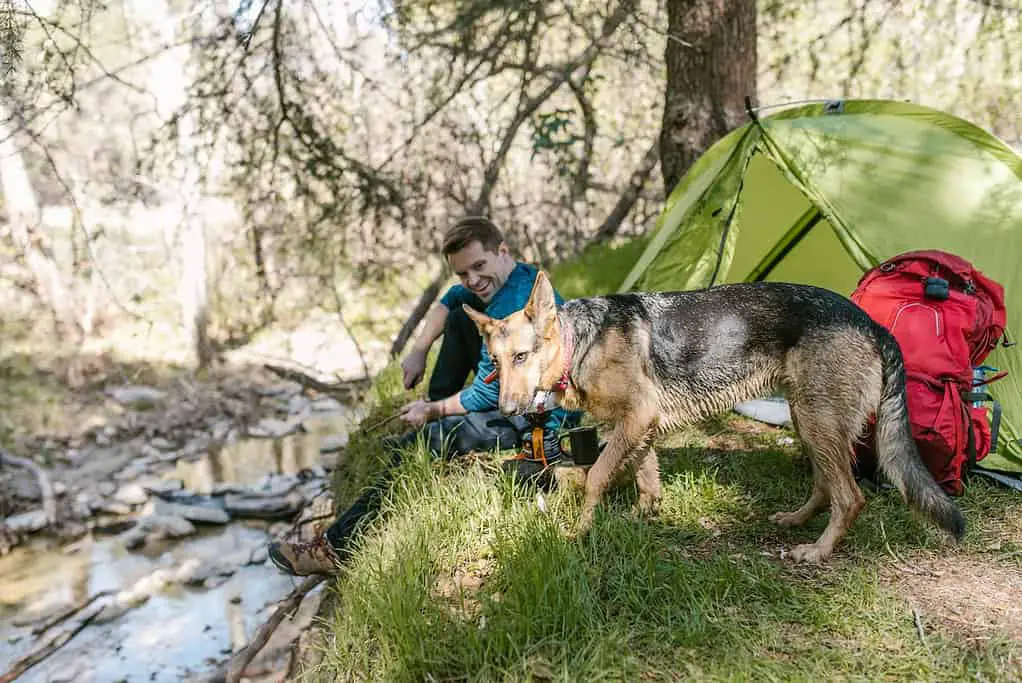
Warning Signs To Separate A German Shepherd And Labrador
If a German Shepherd or Labrador exhibits aggression, arousal, or jealousy towards the other dog, separate them immediately. It is important to prevent any potential harm.
Aggression
Watch for signs of aggression between your German Shepherd and the Lab. While Labs are typically friendly and sociable dogs, even the most amiable dog can get aggressive.
It happens when they feel threatened or territorial. German Shepherds’ protective instincts can sometimes escalate into aggression towards other animals or strangers.
Separate them if you notice growling, snarling, or biting between your two dogs. Both breeds require proper training and socialization from an early age to minimize the likelihood of aggressive behavior. Proper supervision & attention when introducing them is recommended.
Arousal
German Shepherds and Labradors can become easily aroused when interacting with other dogs or animals. It is true for untrained adolescent dogs who have not yet learned how to control their excitement levels.
Arousal can sometimes lead to aggressive behavior. As dog owners, you must monitor the energy levels during playtime and intervene if required. Arousal does not necessarily mean aggression or danger. A healthy level of arousal can be beneficial for dogs as it helps them stay alert, active, and engaged.
Proper attention, training, and socialization help them learn how to channel their energy into positive behaviors.
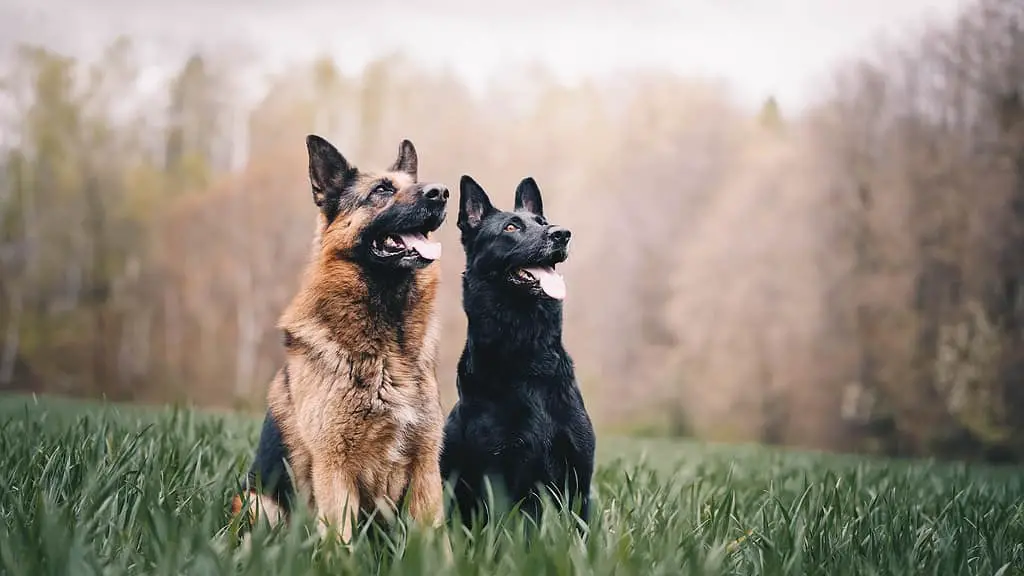
Jealousy
Jealousy is a common issue among dogs, and it can lead to aggression. When introducing them, be mindful of any signs of jealousy between the two breeds. They may become possessive over their toys or food bowls. Separating them during feeding times is best.
One way to prevent jealousy between Labradors and German Shepherds is to ensure each dog has their own space.
This gives them a sense of ownership over their territory, reducing the chance of aggression. Giving each dog its own set of toys can also help prevent jealousy from arising.
Closely supervise interactions between two breeds. Proper socialization and training can go a long way in preventing these issues. Being vigilant about the behaviors and needs of both breeds, pet parents can ensure they get along well.
Separating German Shepherds And Labs At Home
To ensure harmony between German Shepherds and Labs at home, practice separation.
Providing Adequate Space
Providing enough space is important when bringing home a Labrador and German Shepherd puppy. Both breeds are large dogs and need ample room to stretch their legs and play comfortably. If you live in an apartment or condo, ensure your home’s size accommodates both breeds.
Labradors are typically easier-going than German Shepherds. Create separate areas for sleeping and eating too. Providing each dog with a bed and food bowls gives them privacy and minimizes resource competition. Labs and German Shepherds can coexist happily in one household with adequate space.
Separate Bowls And Feeding Times
To avoid potential food aggression, provide separate bowls and feeding times for German Shepherds and Labrador Retrievers. Measure the right portion size according to their weight and age and prevent overfeeding. Proper nutrition is a must.
- Labrador Retrievers need a balanced diet of protein (20-25%) and moderate fat (10-15%).
- German Shepherds require more protein (22-26%) and slightly higher fat levels (16-18%).
Sleeping Arrangements
Provide separate spaces for German Shepherds and Labradors. It ensures that they have their own space and prevents fights over territory.
Providing separate dog beds or crates can make a huge difference in creating a peaceful environment. Establish a routine for feeding and sleeping times. While this may seem minor, having set routines will become ingrained in your pets’ behavior.
It leads to less confusion and more stability. Avoid allowing either breed on the bed with their owners if there is dominance or resource-guarding behavior concern. Sleeping arrangements can be harmonious and stress-free with proper training and clear boundaries.
Separate Doggie Toys
Possessiveness can lead to aggression. Having designated toys for each will ensure they have playthings and avoid arguments. When introducing new toys into the household, supervise the dogs’ interactions. If one dog becomes too possessive of a toy, immediately remove it. Provide another for the other dog.
Rotate the toys regularly so each pup can access different ones at different times. Ensure that plenty of chew toys are available. Chewing is a natural dog behavior and can help alleviate boredom and anxiety. It also keeps their teeth clean and healthy. Providing ample chewable objects will protect your furniture from getting ruined.

Supervision Requirements
When bringing two different breeds together, supervise them closely at first. Even though Labs and German Shepherds have a lot in common, they have unique personalities and preferences.
- Watch how they behave around each other when playing or eating. Another critical factor is training. Ensure both dogs are obedience trained from an early age.
- They must know acceptable behavior around others and follow basic commands such as “sit,” “stay,” “come,” and “leave it.”
- Proper socialization will go a long way in helping the two get along peacefully.
- Don’t if you’re unsure whether your dogs should be left unsupervised together.
- Separate them until you feel confident they’re ready to play nice without any danger of aggression.
Other Compatible Breeds With Labradors
Other breeds that get along with Labradors are Golden Retrievers, Beagles, Border Collies, Dachshunds, and English Springer Spaniels.
Golden Retriever
Golden Retriever is a popular dog breed recognized for their friendly and calm temperament. They get along well with other pets and make excellent family dogs. Golden Retrievers have an average exercise requirement, making them easy to care for. They do not require high-intensity exercises.
While Golden Retrievers are intelligent dogs, they can sometimes be curious. Proper obedience training and early socialization help them excel in several areas, like search and rescue.

Beagle
Beagles are known for their friendly and outgoing personality, making them excellent family companions. They are easy-going and adaptable, fitting well into different households.
Beagles have a strong prey drive, so it’s important to supervise interactions with smaller pets such as cats or rabbits. When properly trained and socialized from a young age, beagles can coexist peacefully with other pets. Beagles make great additions to homes looking for an affectionate and playful dog breed.
Border Collies
Border Collies are intelligent and active dogs. They make great companions for owners who lead an active lifestyle. They have a strong herding instinct and require plenty of exercises and mental stimulation. These energetic dogs excel in agility training, obedience competitions, and even frisbee catching.
Border Collies can get along well with other breeds. However, their high energy level may be too much for some dogs to handle. You must provide enough space for the Border Collie and another dog to play. It prevents them from feeling overwhelmed or threatened by each other’s presence.
Dachshund
Dachshunds or Wiener dogs are a small breed that sometimes has an attitude bigger than their size. They are affectionate and playful dogs that often bond closely with their owners. While they may not be the most energetic breed, they still require daily exercise to maintain a healthy weight.
Despite being small, Dachshunds have been bred for hunting and have a strong prey drive. It is important to socialize them early on to avoid aggression towards other animals or people. Dachshunds can get along well with other dogs and pets with proper training and socialization.

English Springer Spaniel
The English Springer Spaniel is a widely known breed for its affectionate and friendly nature. Like Labs, they get along well with children and are considered great family pets. English Springer Spaniels can also be trained as hunting dogs, particularly when flushing out birds.
They have an excellent sense of smell and love the thrill of the hunt. Due to their high energy levels, they require regular exercises, like daily walks or runs. Proper training is vital as they bark excessively if left untrained.
They make wonderful companions with proper socialization and obedience training from an early age.
Getting German Shepherds And Labrador Puppies
It is important to find a reputable breeder. Ensure they are socialized properly from an early age. These energetic playmates love spending time with their families. They are loyal protectors.
German Shepherds and Labs are large breeds requiring lots of exercise and training. This means they may not be suitable for first-time dog owners.
Individuals who don’t have the time to devote to consistent training sessions must choose another breed. These breeds are prone to certain health issues, such as hip dysplasia, which a veterinarian should monitor closely.
German Shepherds and Labs can make great additions if you’re willing to put in the work required for proper training and care. Whether on their own or together as part of a mixed-breed dog.
Labrador German Shepherd Mix
Get a German shepherd lab mix if you want the best of German Shepherds and Labradors. A lab German Shepherd mix is produced by mating a Labrador and a German shepherd.
They are easy to train, intelligent, loyal, and excellent companion dogs. Their high exercise needs must be met for best behavior reflection. Lab German shepherd mix was bred for different purposes initially but has slowly become popular among breeders. Like all dogs, they are best when correctly cared for.
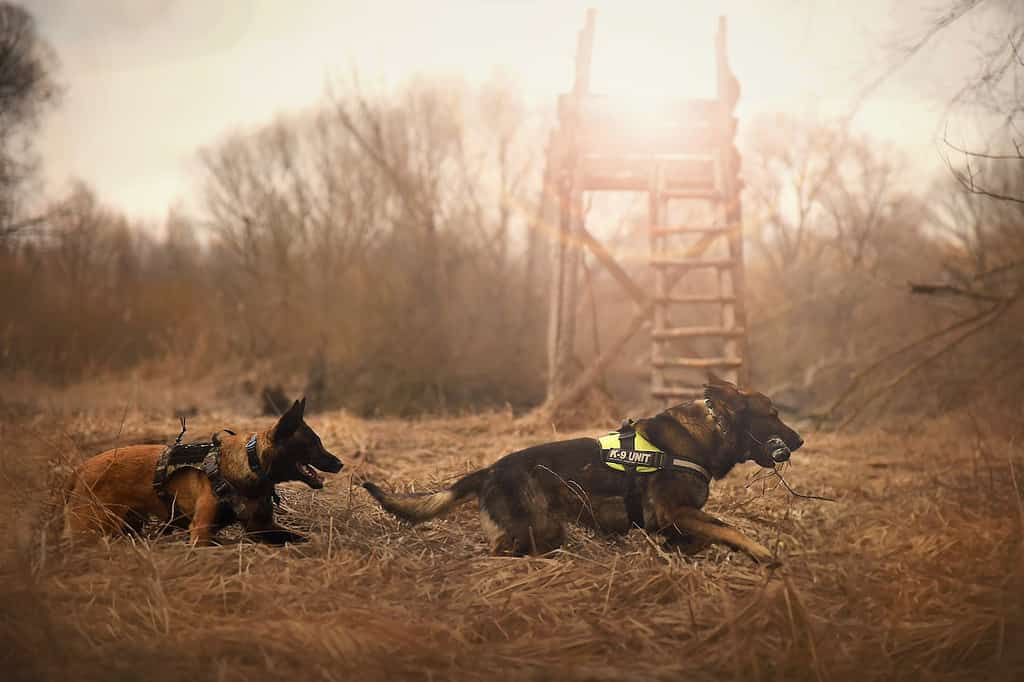
Can Small Dogs Live With German Shepherds?
Small dogs can live with German Shepherds, depending on their personalities. Ensure you socialize them early and supervise them during the interaction.
Small dogs may be frailer than larger breeds, so proper training and tolerance are vital. German Shepherds have a natural protective instinct toward their family and may see small dogs as threats.
Introducing them gradually to living together is critical for a successful relationship. Avoid leaving them alone without supervision, especially when tensions arise because of food or toys.
FAQs
What dog goes well with a German Shepherd?
A purebred German shepherd dog is popular for aggression but is friendly with other dog breeds. Labrador retrievers, Golden retrievers, and Border Collies are a few examples.
What dog gets along best with Labs?
German shepherd gets along best with a labrador retriever. It is due to their similarity in physical attributes and intelligence. They enjoy being with each other and can be left unsupervised after a few interactions.
What breeds do German Shepherds not get along with?
Some German shepherd dogs have a dominant nature. It is highly reflective around small breeds like terriers or Dachshunds. Dominance conveys that the dog does not respect others, which leads to aggression.
Are dogs happier with other dog breeds?
Dogs are sociable and usually seem happy around other dogs and pets. However, proper introduction and supervision are essential for the best results.
Do Labradors prefer other dogs?
Labrador retriever is mostly good with other dogs, pets, and families. However, they need proper training to tone down their natural exuberance.
Is it better to have 2 dogs of the same gender?
There is no proof that a female dog will be a better companion for a male dog. However, it is slightly easier to manage female dogs. Same-sex dogs can be tricky due to dominance concerns.
Author Profile

- Lifetime dog Enthusiast
- Shradha is a seasoned writer at Labradorandyou.com, an authoritative resource for all things Labrador Retriever. Her experience as a pet owner and dog enthusiast drives her to create meticulously researched and fact-checked content, offering valuable insights on Labrador training, grooming, and health. Each article reflects Shradha's passion and dedication, enriched by personal experiences with her beloved Labradors, Tom, and Kurt. Whether exploring breed-specific training techniques or providing product reviews, Shradha ensures Labrador owners receive the most accurate, up-to-date, and trustworthy information, aimed at enhancing their companions' health and happiness
Also by the author
-
 Lab-TypesJuly 7, 2025موقع Algorithm Steps Explained: تحسين طريقة لعبك على 1xbet
Lab-TypesJuly 7, 2025موقع Algorithm Steps Explained: تحسين طريقة لعبك على 1xbet
-
 Lab-TypesJuly 6, 2025Мостбет Вход актуальные Способы Попасть и Официальный Сайт”
Lab-TypesJuly 6, 2025Мостбет Вход актуальные Способы Попасть и Официальный Сайт”
-
 Lab-TypesJuly 6, 2025Zakłady Sportowe Za Darmo: Grunzochse Unikać Pułapek Beraka Travel Companies & Tour Operators In Sri Lanka
Lab-TypesJuly 6, 2025Zakłady Sportowe Za Darmo: Grunzochse Unikać Pułapek Beraka Travel Companies & Tour Operators In Sri Lanka
-
 casino utan svensk licensJuly 6, 2025Tips för att spela på casino säkert och ansvarsfullt online
casino utan svensk licensJuly 6, 2025Tips för att spela på casino säkert och ansvarsfullt online





